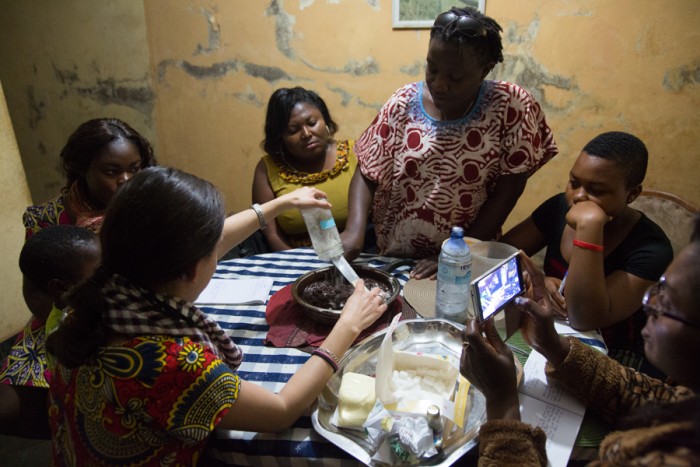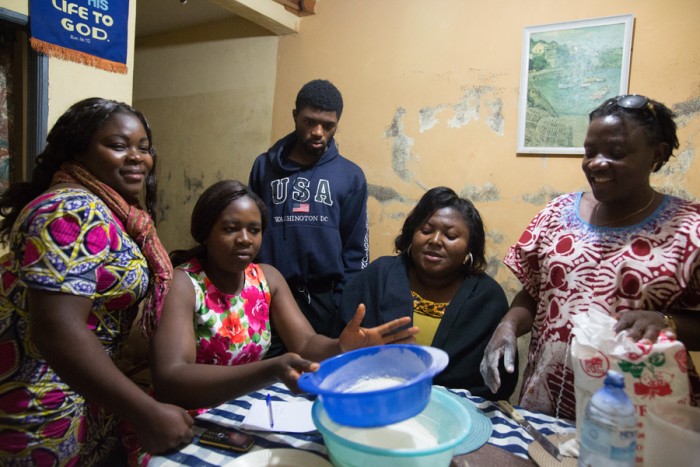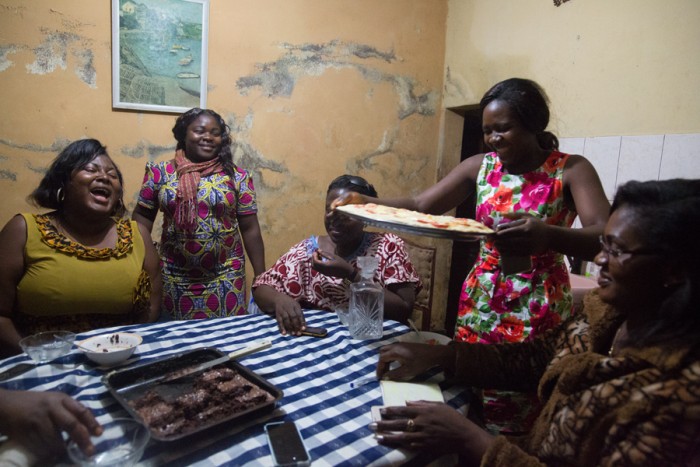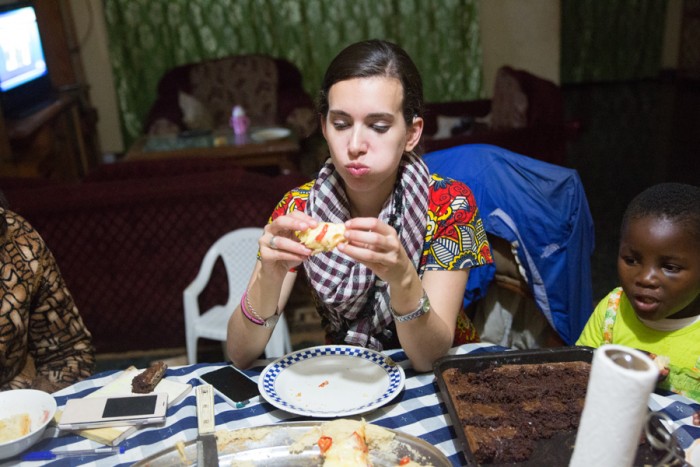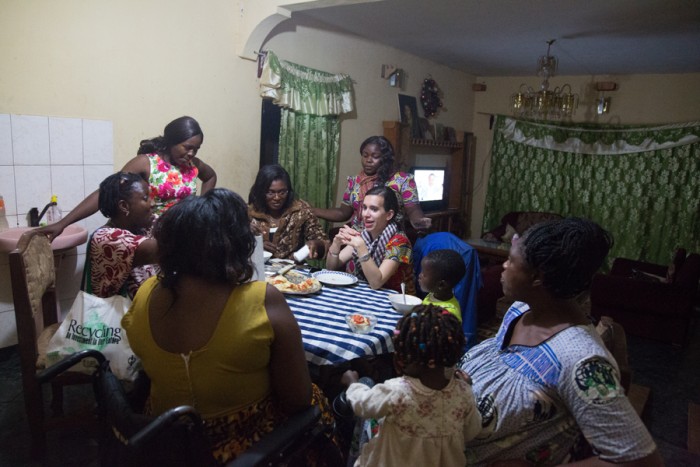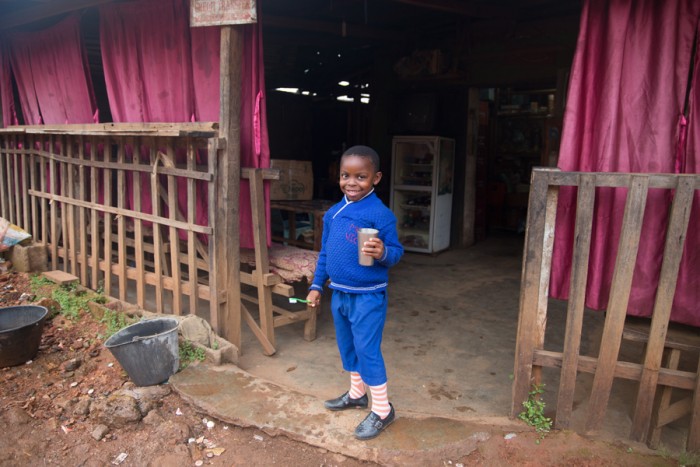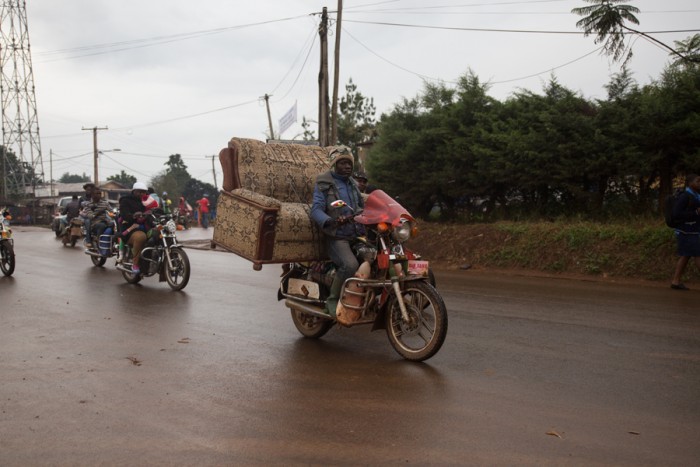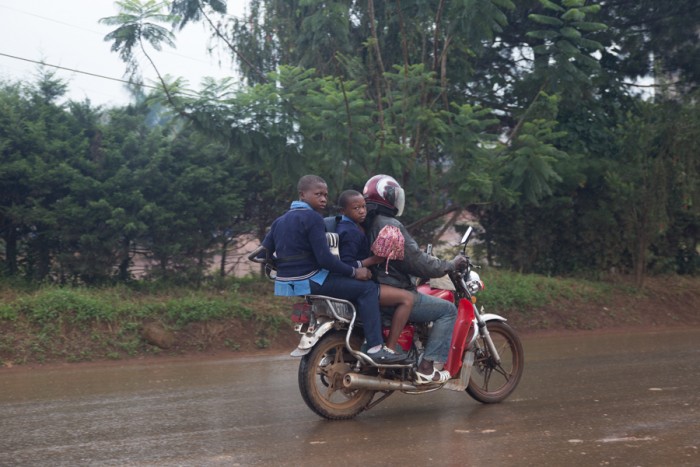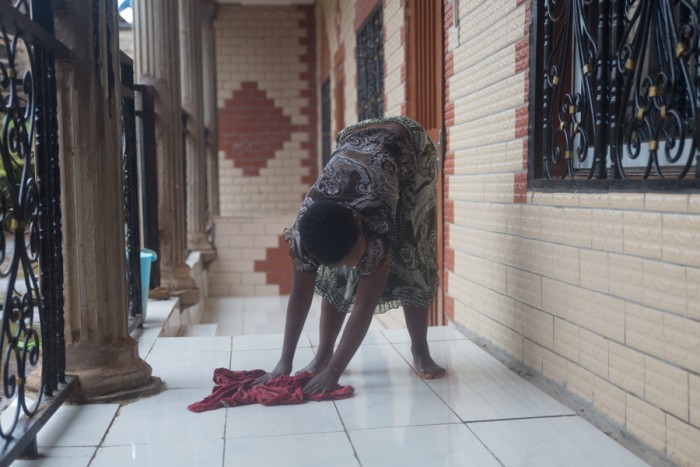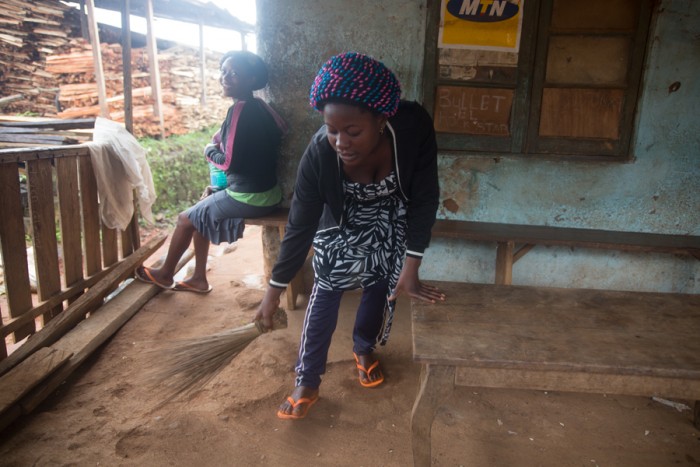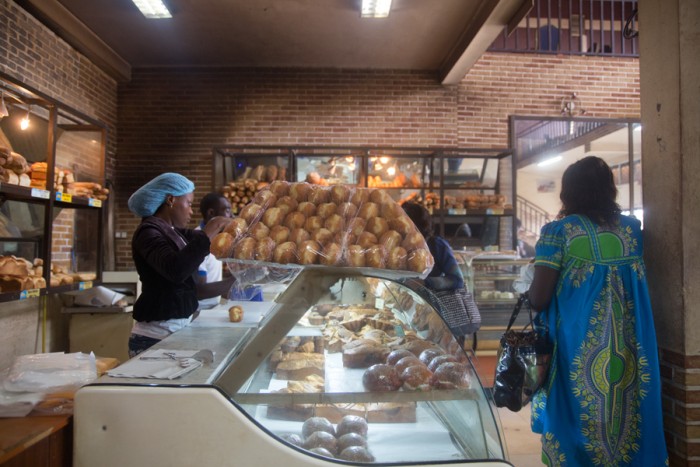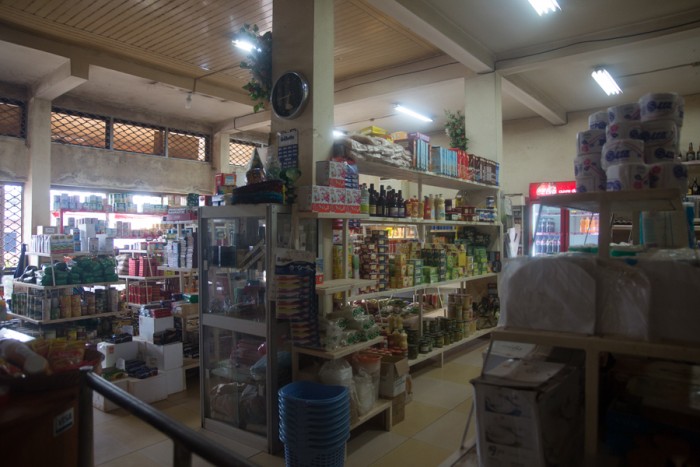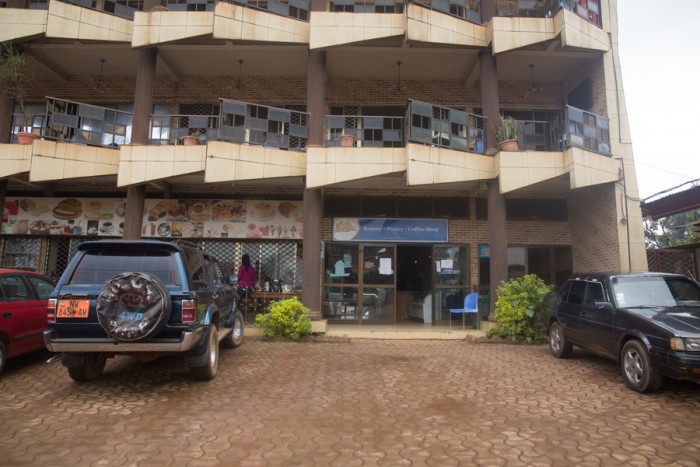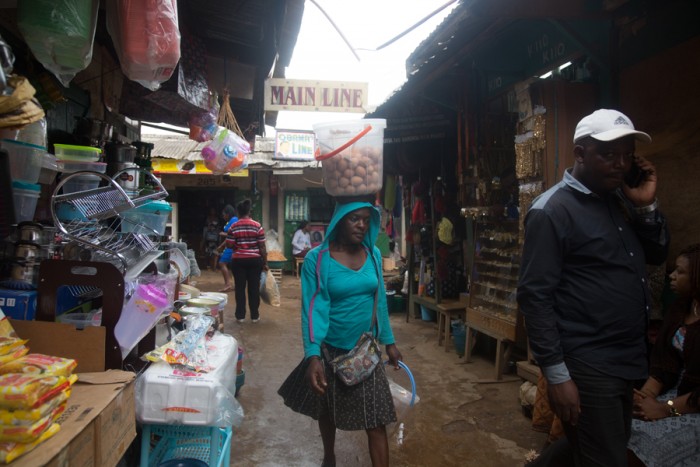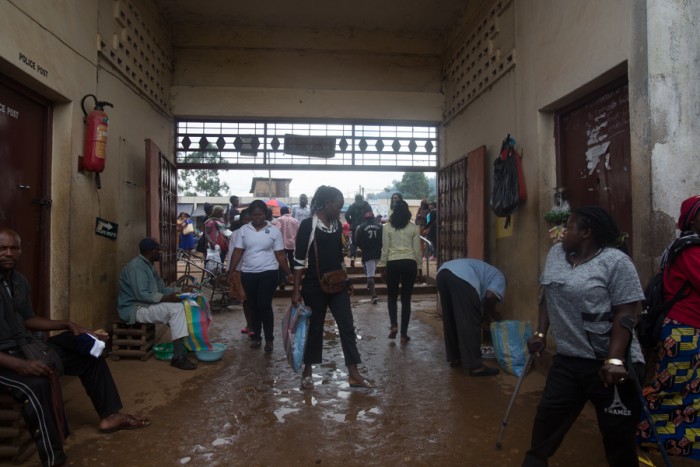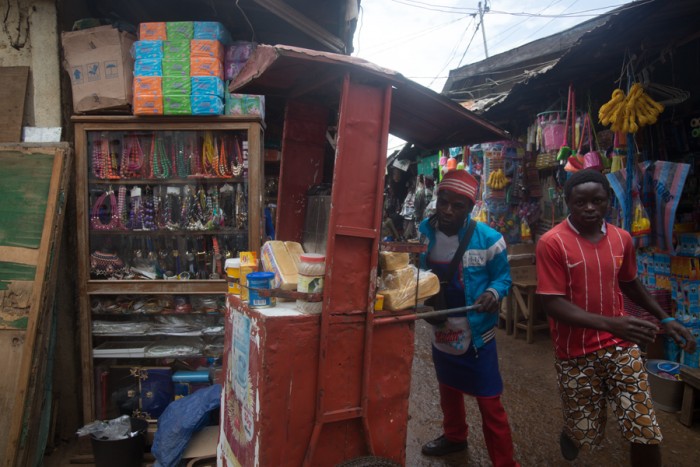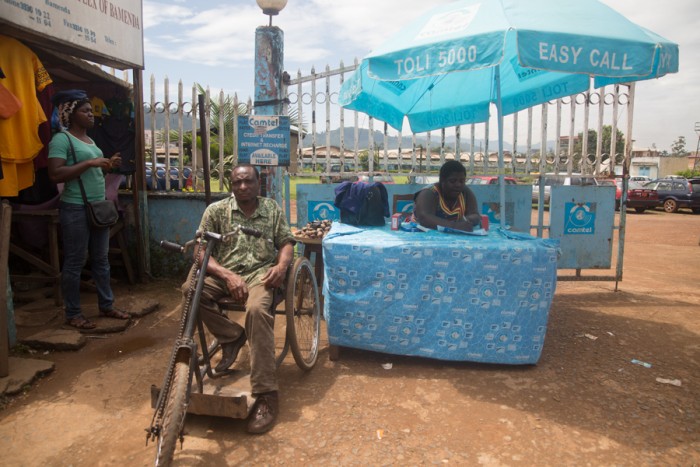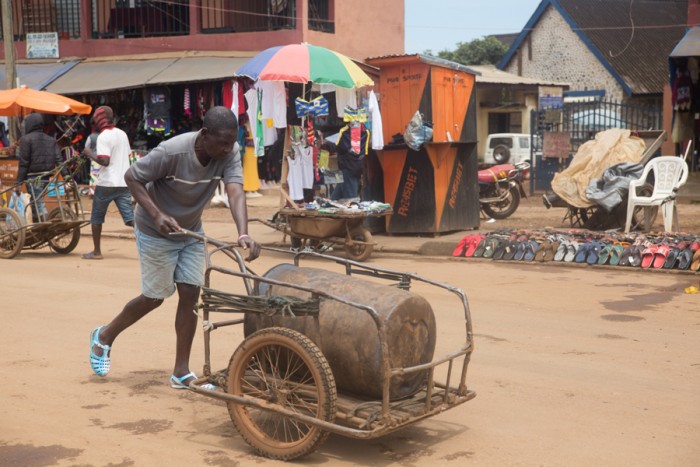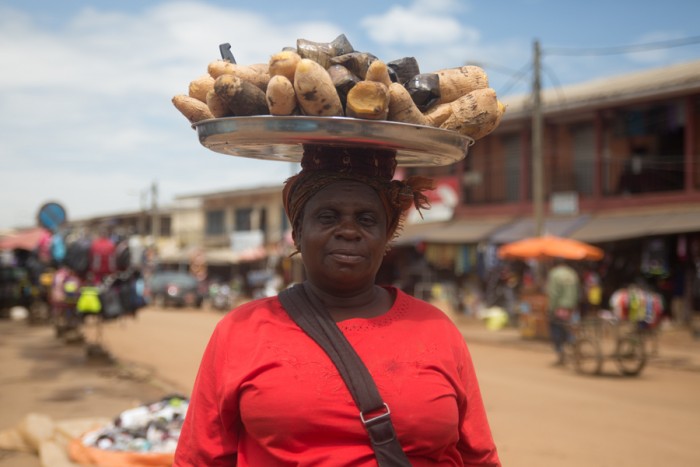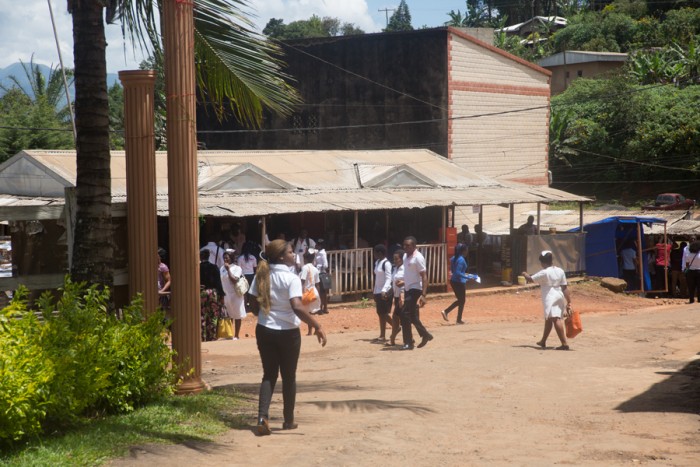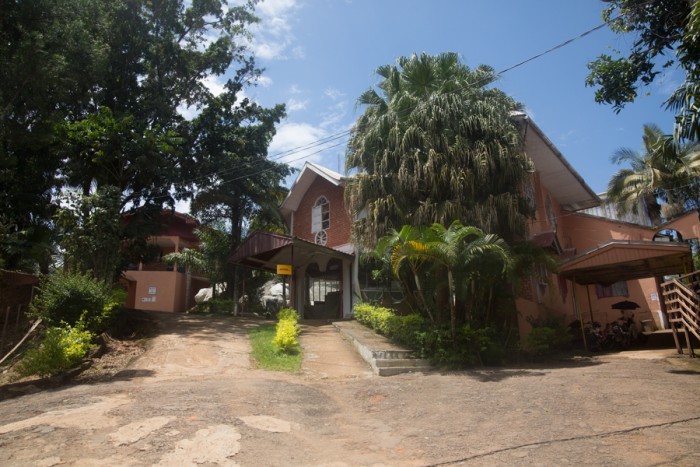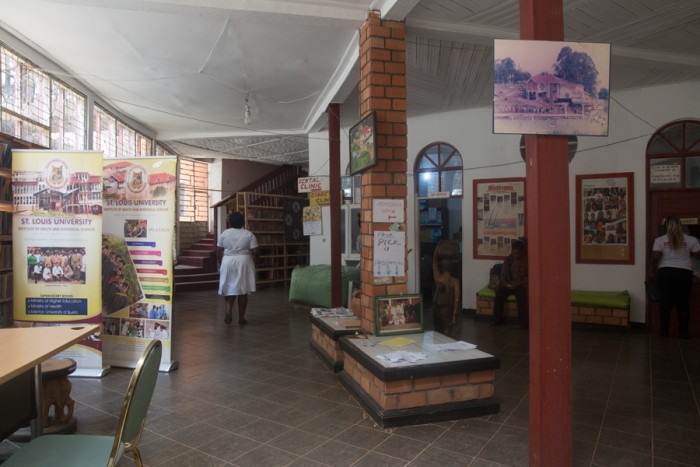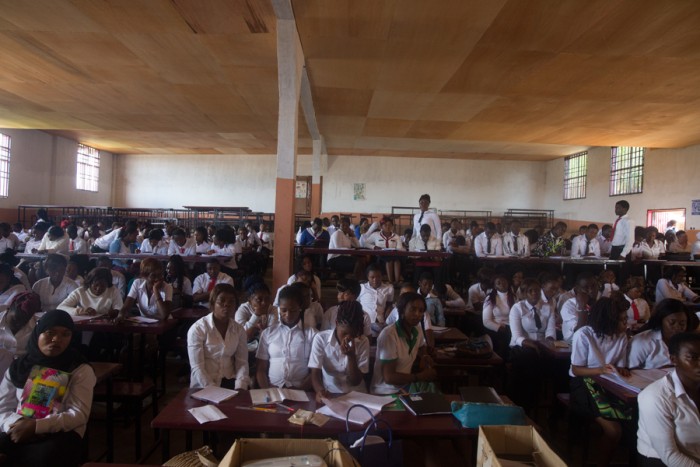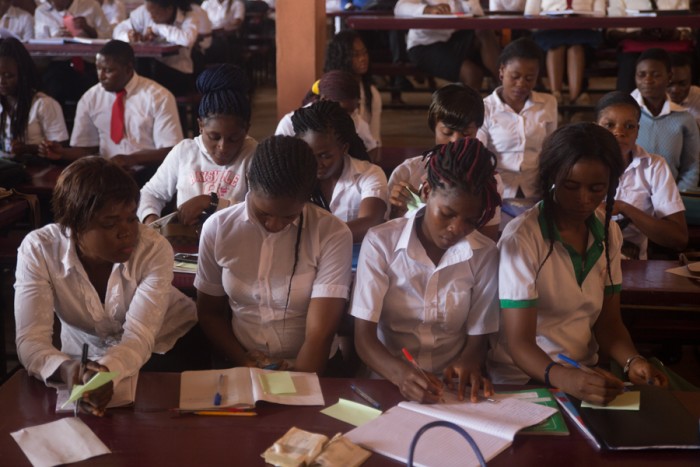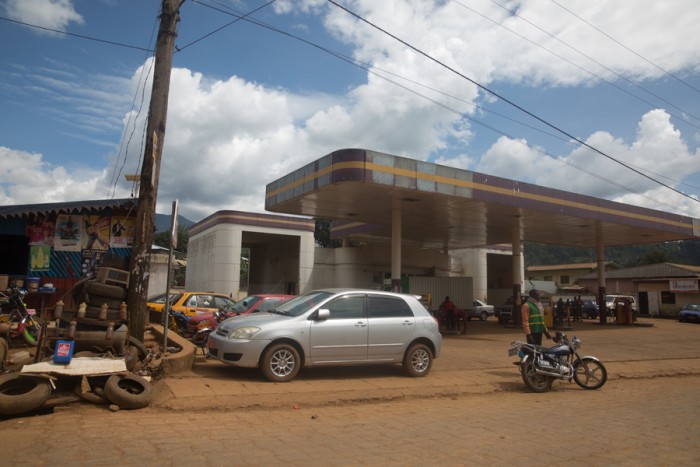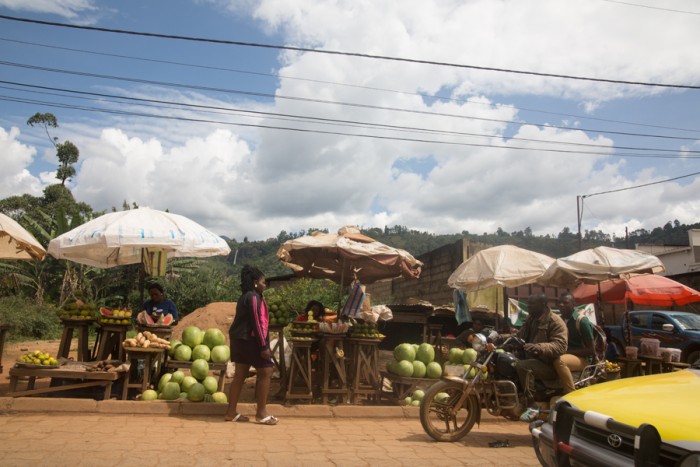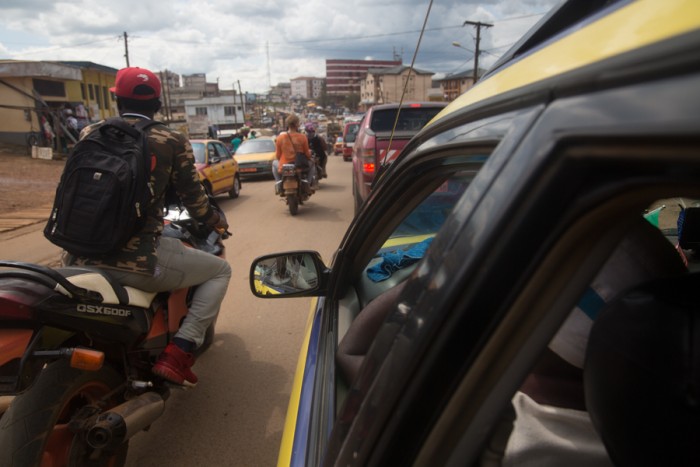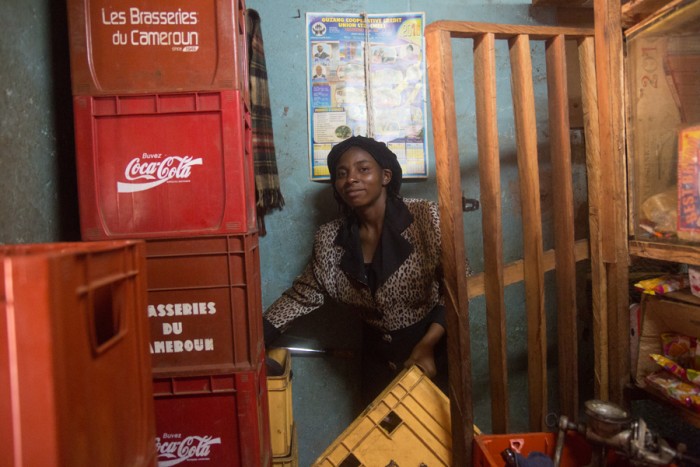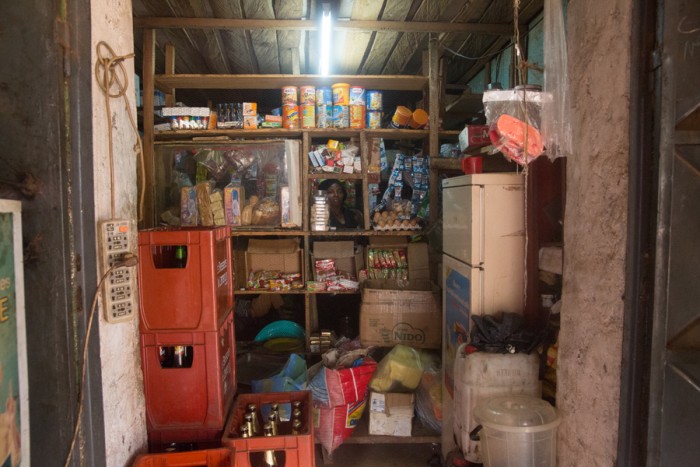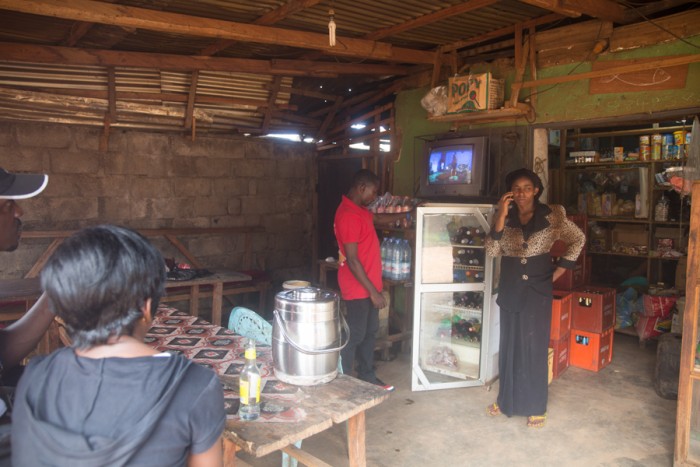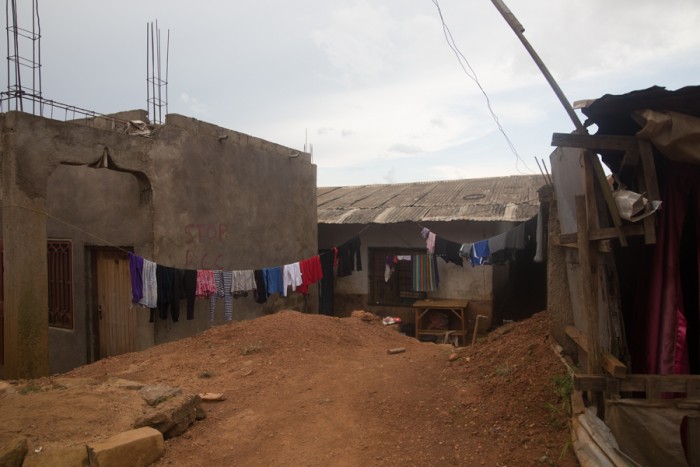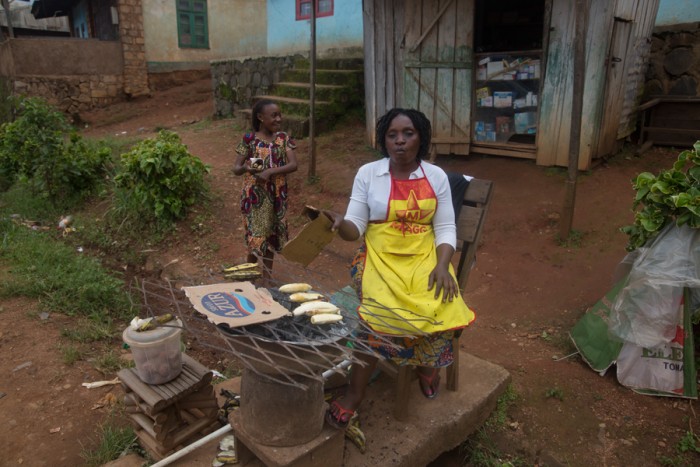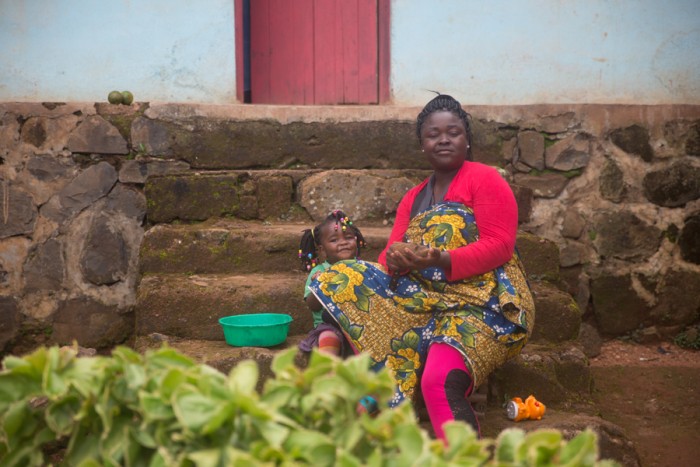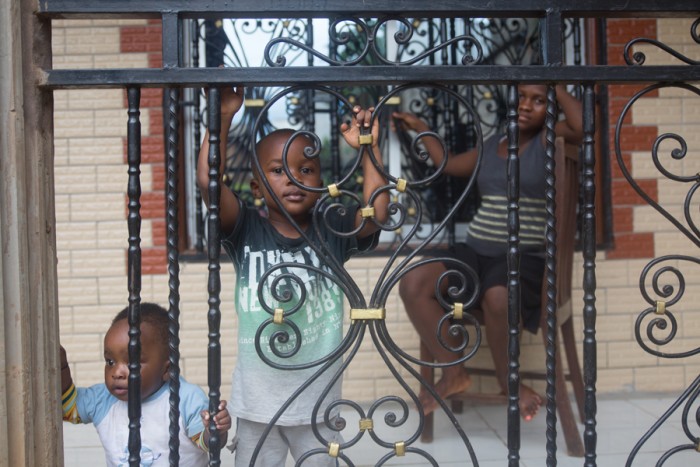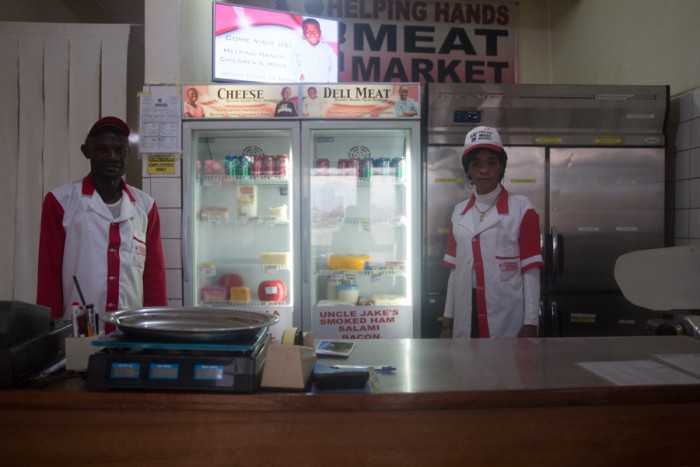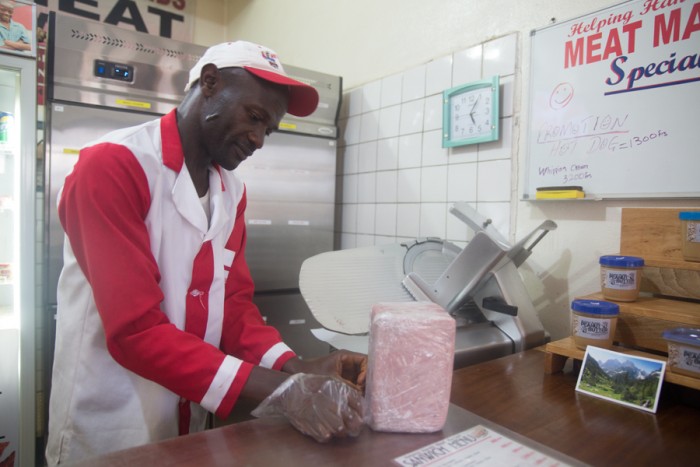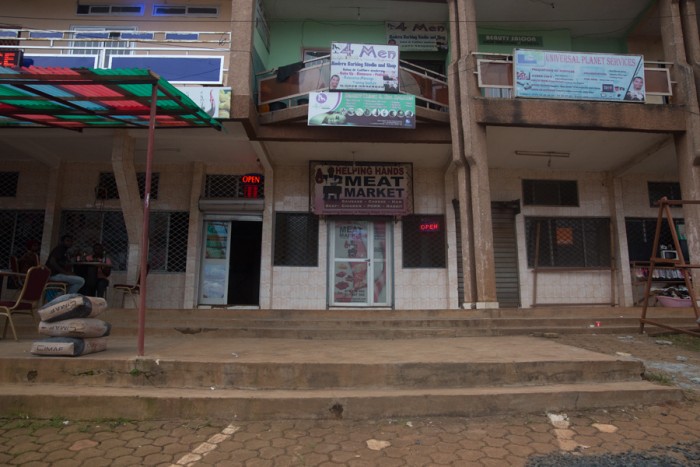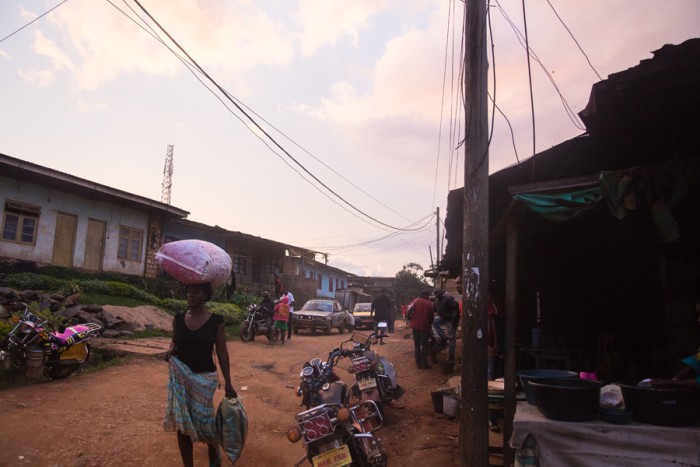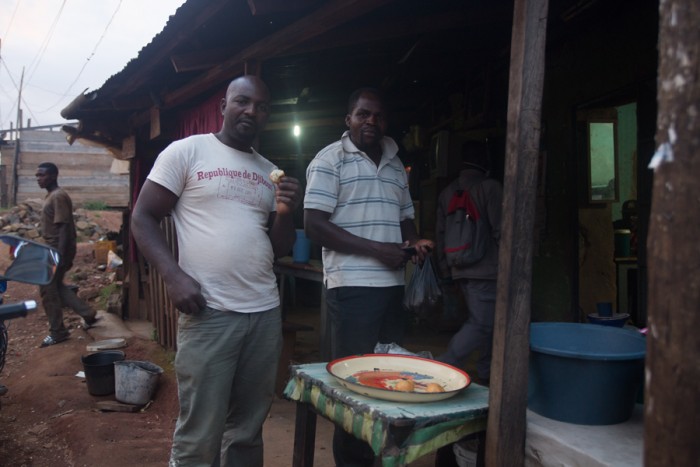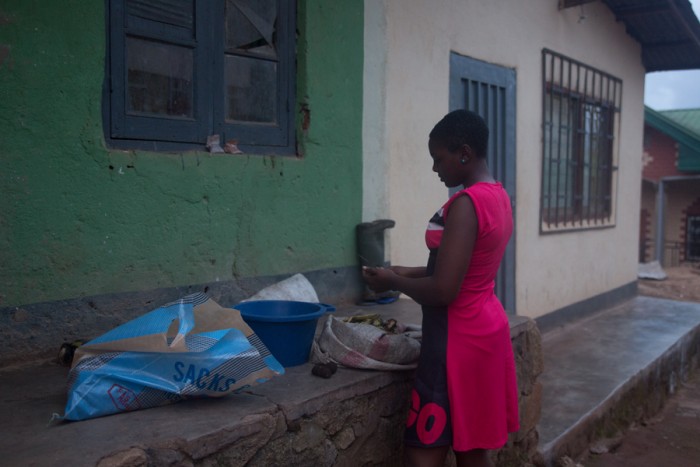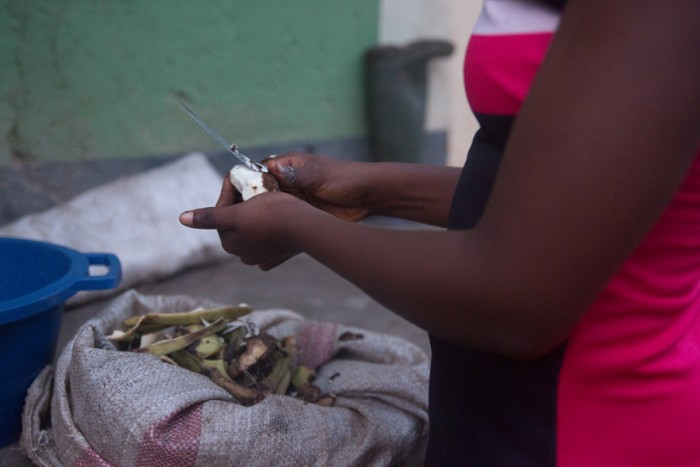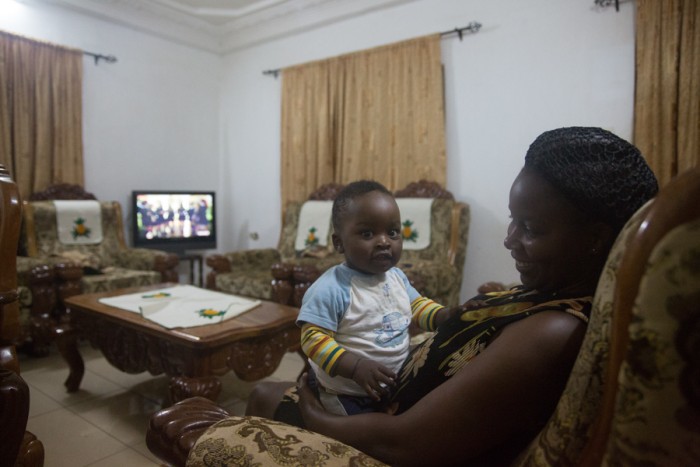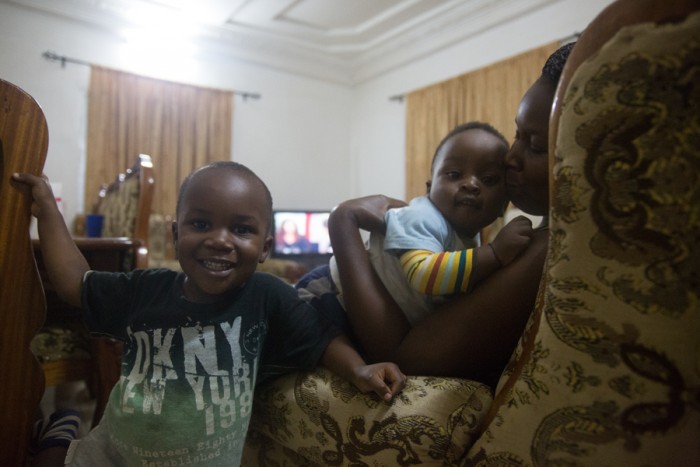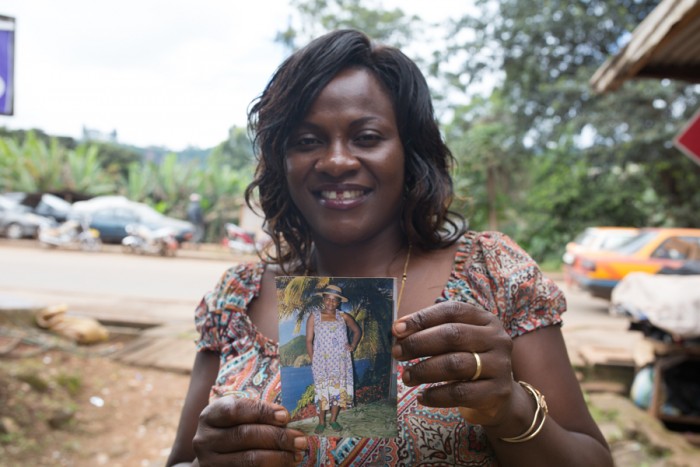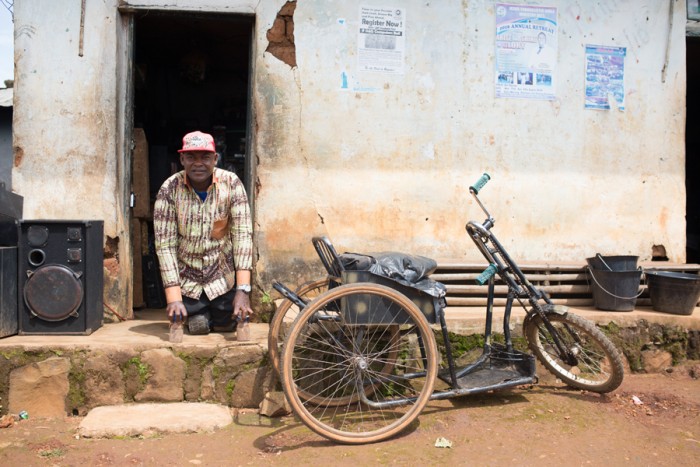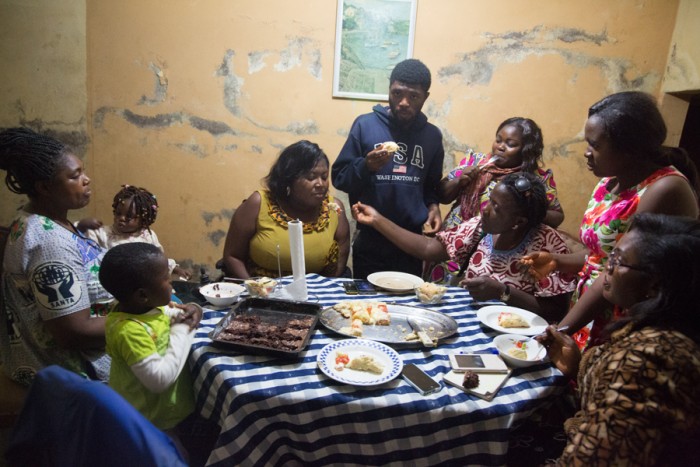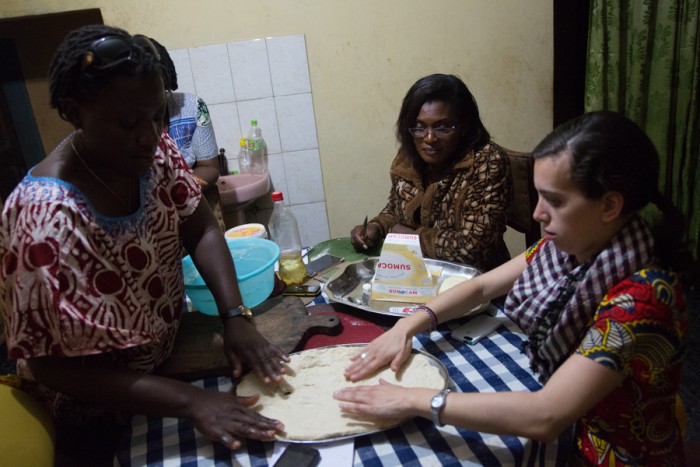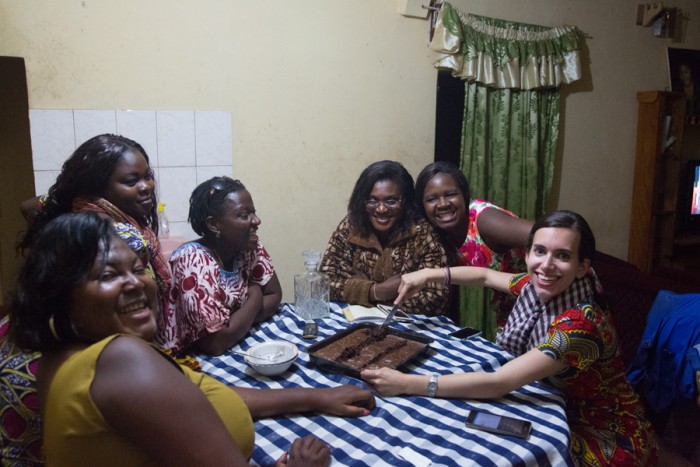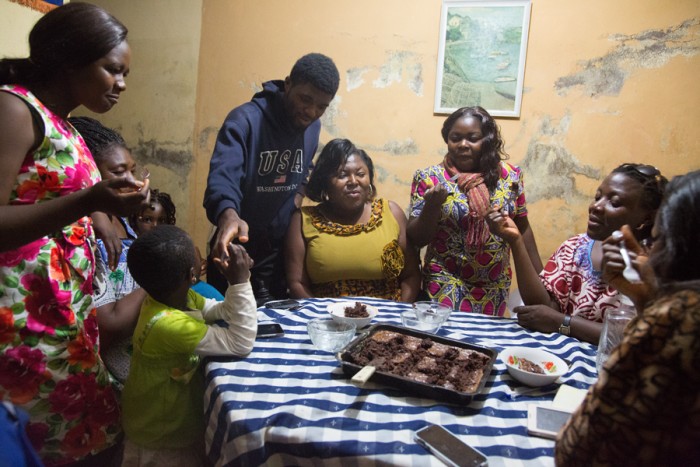October 14th, 2016 by Rachel | Tags: Disability, Peace Corps, Sexual Reproductive Health | No Comments »
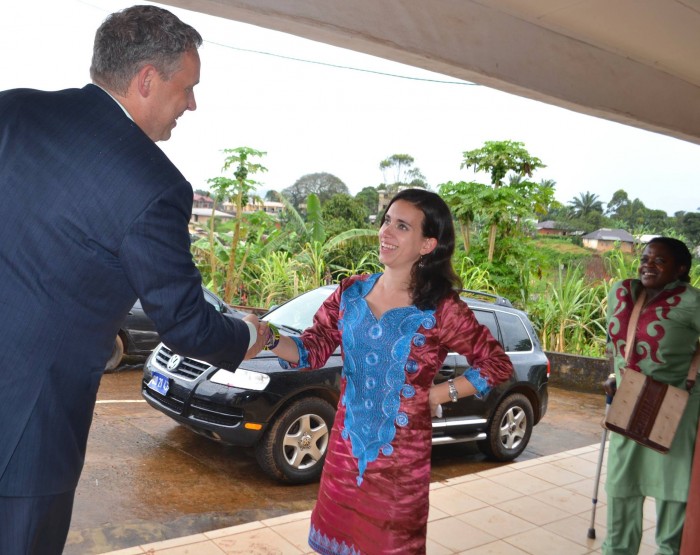
Me shaking Deputy Chief of Mission Matthew Smith’s hand and welcoming him to the the Sexual Reproductive Health workshop. Photo Credit: U.S. Embassy Yaounde
Last month, Peace Corps Cameroon’s Country Director Mark and Deputy Director Lindsey visited my home to tell me that Deputy Chief of Missions Matthew Smith and his team from the U.S. Embassy would like to visit my site and see my work as part of the U.S. Embassy’s Peace Corps day, which meant that day would be all about seeing Peace Corps’ volunteers’ work. On this day, they would be visiting a training for volunteers, one of my postmates and me.
Two weeks later, DCM Smith, Public Affairs Officer Robert Quiroz and their team came to Bali, a village located about 20 minutes south of Bamenda, to see my workshop on Sexual Reproductive Health for persons with disabilities. The U.S. Embassy team came in two large SUVs, along with a police escorting them on a motorcycle, and Peace Corps Deputy Director Lindsey also came. Ruth and I both welcomed them to the workshop with handshakes and hugs.
All of my work partners, including Ruth, Samuel, Veronica, the program officer for Coordinating Unit of Association for Persons with Disabilities, Regina, sign language interpreter and advocate for the deaf, and also Hilda, came to be part of the workshop. While I presented in Grammar English, the president of the Bali disability group translated the presentation to Pidgin English. Regina also interpreted for a deaf participant.
38 persons with disabilities attended the workshop. There were a few children there. We didn’t ask children to come but the parents likely made the choice to send them to the workshop. Because the workshop took place at 1 PM in the afternoon, my team and I assumed that these children who have disabilities are not in school like most children with disabilities in Cameroon.
At the end of the presentation, we opened up to questions for participants and we received very interesting questions and comments which included:
“Is there an expiration on the condoms?”
“Can women become more fertile after taking and stopping the birth control pill?”
“Men will feel hurt if women say “no” to sex.”
I certainly clarified to the man who talked about men feeling hurt about women saying “no” to sex. I explained to him that if a woman says “no,” she still has every right to say “no,” and he needs to be patient and wait until she is ready to have sex.
We conducted the pre- and post-tests. On the pre-test, 14 people scored 70% or better. On post-test, 19 people scored 70% or better. On the pre-test, no one scored 100% but one scored 92%. On the post-test, two scored 100% including the person who had scored 92%. On the pre-test, everyone except for one scored below 80%. On the post-test, nine scored 80% or better.
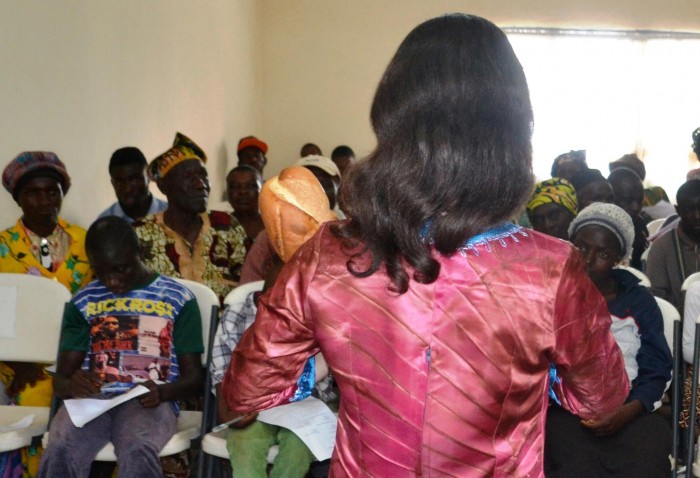
Me demonstrating family planning and explaining to them the impact of family planning through using bread. Photo Credit: U.S. Embassy Yaounde
After the workshop, the mayor of Bali gave a short talk thanking the persons with disabilities for being present. She also thanked the U.S. Embassy and Peace Corps for coming. Ruth and Samuel also expressed gratitude to the disability group and the U.S. Embassy and Peace Corps. The president of the disability group showed great excitement as he snapped pictures with his phone throughout the presentation. The U.S. Embassy and Peace Corps’ visit gave them a good insight of what a disability community looks like in Cameroon.
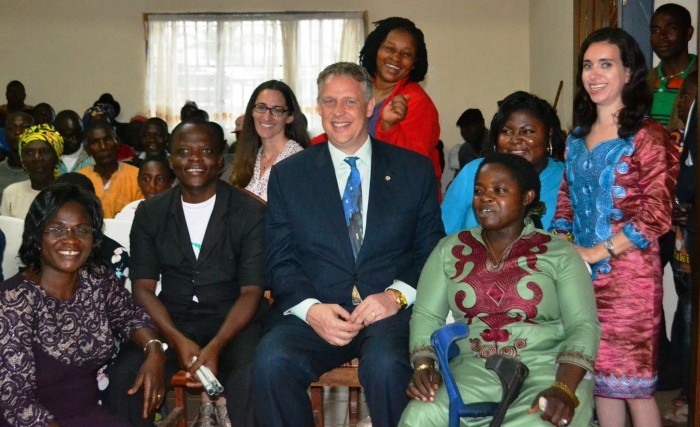
Left to Right: Regina, Samuel, Lindsey, Deputy Chief of Mission Smith, Veronica, Ruth, Hilda and Rachel. Photo Credit: U.S. Embassy Yaounde
October 12th, 2016 by Rachel | Tags: Peace Corps, Photo Essay, Photography | No Comments »
This is a photo essay showing a window of 12 hours of the world in which I lived for the past two years. Bamenda is a wild and chaotic city with an environment that is so different from the one in which I grew up.
This project was inspired by a photo assignment I did in a photography class at Savannah College of Art and Design where I had to photograph a photo every hour for 12 hours. This project was also inspired by Alex’s 20 hours in Mbakaou photo project. I could not do beyond 12 hours because Bamenda is known as a crime-ridden city, meaning that it’s dangerous to be outside alone at night. I am typically at home between 7 PM at 7 AM.
7 AM: At this time, children are heading to school. Children typically go to school by themselves without parental supervision. They take taxis and moto bikes on their own. If they’re attending private schools, sometimes they take a school bus provided by the private school. All children wear uniforms to school. When looking at the streets, someone who has never grown up in a developing country can find the scene to be different and amusing. I caught a picture of a man carrying a large couch on his moto bike.
8 AM: Cameroonians are known for being super clean even though the environment may look very dusty. They clean every day, typically in the mornings.
9 AM: Bamenda has many bakeries throughout the city offering a variety of bread and baked goods. I regularly visited the bakery, Imagine Bakery. This bakery also has a supermarket where I can find pastas, yogurts, olive oil, soaps, and toilet paper.
10 AM: People primarily shop at outdoor markets where they can find any product they need, ranging from food to plastic containers to clothes.
11 AM: Most Cameroonians do not have a monthly phone and internet bill unlike Americans in the US. Most use “pay-to-go” phone and internet service. They purchase phone credits from people on the street or working in small business shops who are selling phone credits, which we call “phone transfers.” Other images show what life on the streets looks like. People traditionally carry food and things on top of their heads. Carts are commonly used to carry heavy items.
12 PM: Bamenda is a university town, meaning it’s a home to a number of universities. I visited a university, St. Louis University of Institute of Health and Biomedical to host a workshop for health students. The structure of the university looks similar to those in the US. There are several buildings and a campus where students can walk around, socialize and study.
1 PM: At this time, I was giving a workshop to over 100 health students. The lecture hall looks no different from the lecture halls we see around the world. It can often be huge. Note that the student environment is similar to what we see in the US – we can find students texting during class.
2 PM: No matter what time of the day it is, there is always traffic in Bamenda. When riding in a taxi, one can sit in the car for a long time while the taxi is moving slowly. Riding a moto bike can take less time because it can speed past the cars. Gas stations look no different from what we see in any other countries around the world. Food stalls are commonly found on the sidewalks or curbs of the streets, which can make walking in the city challenging because they take up all the space that can be used for pedestrians to walk safely.
3 PM: This is Vivian, my neighbor who lives in front of me. She owns a small shop selling many necessity items, such as eggs, flour, bread, chocolate spread, phone transfers, and milk powder. She also sells beer and offers a seating area for people to drink and eat. Vivian is also a caring person who has made sure I was never harassed and always greeted me with a lovely smile. She has one adorable young son whom I play with sometimes. He is the boy in the very first photo above.
4 PM: At this time, children are returning home from school. While street food can be found throughout the day, there are more people cooking street food at this time than at any other time of the day. One can find a woman cooking grilled plantains to sell. One can also find people just sitting outside and socializing with others and eating snacks. Children can be found playing outside too. Because washing machines and dryers rarely exist in Cameroon, people wash clothes by hand, and so, we see clothes hung up everywhere in the city.
5 PM: While most people shop for food at outdoor markets, some people such as myself buy some food at Helping Hands, a deli store owned by an American expat. Because I do not have the courage to kill animals and prepare the meat myself, I purchase boneless chicken and ground beef at Helping Hands. They also sell a variety of cheeses and deli ham. It is the only place in the city that has cheddar cheese and bacon. They also sell sub sandwiches. I go to this place so many times that people know me by my name.
6 PM: The sun is setting by this time. I often say that Cameroon is in the wrong time zone. It lies below western Europe but is one hour behind western Europe. Cameroon is in the same time zone as other west African countries. People are preparing and eating dinner during this time.
7 PM: People are at home and spending time with their families. This my landlord’s wife and her two adorable children. Cameroonians traditionally watch TV in the evenings.
October 11th, 2016 by Rachel | Tags: Disability, Peace Corps, Persons with Disabilities of Cameroon, Photography | 1 Comment »
During the last seven months of my Peace Corps service, I am featuring photographs and stories of several persons with disabilities living in Cameroon. All the photos are part of a series called “Persons with Disabilities of Cameroon.” The goal of presenting photographs and their stories is to create better awareness about the plights that persons with disabilities face in a developing country. When I return to the US, I hope to exhibit this series in a gallery and publish a book to educate others about persons with disabilities living in developing countries as this topic is so rarely discussed in the media.
Regina, a tireless advocate for the deaf, hears normally but happens to have had a sister, Agnes, who was born deaf. Her sister unfortunately passed away several years ago but to keep her legacy alive, Regina founded an organization to help improve the lives of the deaf, in particular young adults. Regina shared her sister’s story with me.
Agnes’ deafness was first discovered not long after she was born. “At the age when a child normally speaks their first words, my mother noticed she could perceive only very loud sounds,” said Regina, “She was taken to an audiologist who examined and confirmed her deaf.”
Because of the time and place where Agnes’ was born, resources for teaching her language and communication were limited. “Back in the 70’s sign language was not commonly used in Cameroon and schools for hearing impaired were also not adequate. Therefore, my parents sought out counseling,” said Regina, “They were advised to include her in all activities at home and practice talking to her using speech and signs, total communication.”
“They developed a strategy to communicate with her using speech and our own signs at home and we used a lot of normal speech. So it was like total communication but the signs were not standardized. They were our own developed signs,” said Regina.
“The doctor advised to include her in all activities with all other children and she should be treated like any other children. She was included in all activities. She could read lips very effectively. At the schooling age, she went to a normal regular school. When she finished primary school, she went to secondary school,” said Regina.
“At school going age, she attended a regular primary school where she studied with other children without disabilities. She did seven years, passed her Common Entrance examination and also succeeded in her First School Leaving certificate examination. During this period, she underwent many medical checkups during which attempts to give hear hearing aids failed. This was because she complained of very intense headache whenever she was being tested for them,” said Regina.
“When completing class seven [equivalent of completing elementary school in the US], she gained admission into St. Mary Secondary School in Ndop. When she got to form 3 [equivalent of second year high school in the US], she became pregnant and had to stop going to school,” said Regina.
“My parents explained to her that she was going to become a mum and needed to stay at home for a little while so that the family could take care of both her and her unborn child,” said Regina.
“After she had her baby girl, she decided on not going back to pursue regular education but to learn knitting. She also learned hair dressing. In addition to the skills she had acquired, she decided to become a business woman. She received a lot of financial and moral support from the family to run a provisional store at Bokwango Buea. Her literacy skills combined with the fact that she could lip read eased her communication with hearing people in all her daily transactions,” said Regina.
“Agnes was an amazing person with a lot of sympathy for deaf persons. She encouraged other deaf children acquire skills that would help them to grow up to be self-reliant. My sister lived a fulfilled life especially as she came from a home where she was accepted. She never saw her disability as a barrier to achieving whatever she wanted,” said Regina.
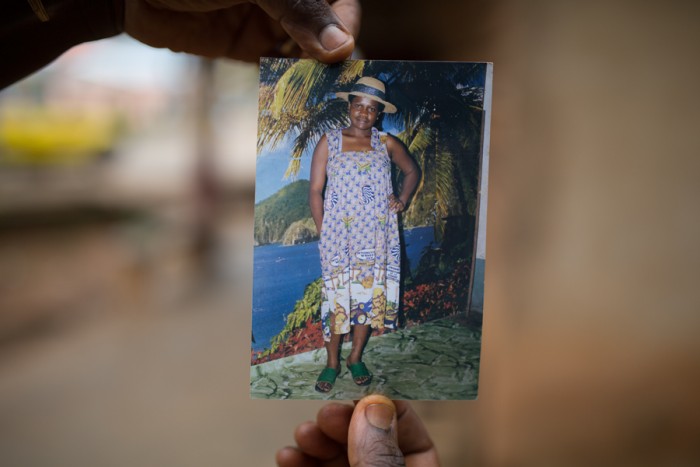
“Shortly after she passed away, I decided that I would like to continue to impact the lives of deaf children as she did. With the help and encouragement from the Coordinating Unit of Association of Persons with Disabilities (CAUPWD) and Northwest Association of Women with Disabilities, I formed the Agnes Association for the Empowerment of the Deaf and Vulnerable Persons (AAEDVP) with the goal of improving quality of life of the deaf and vulnerable persons and mission to enhance effective inclusion and participation of Deaf and Vulnerable persons in inclusive development,” said Regina.
Regina has a Masters degree in special education. She went to a teacher’s training college where she learned sign language. She taught at a secondary school for the deaf for five years. She now focuses on advocacy work for deaf persons as a volunteer project officer and deaf interpreter at the CUAPWD and promoter of the AAEDVP.
October 6th, 2016 by Rachel | Tags: Disability, Peace Corps, Persons with Disabilities of Cameroon, Photography | No Comments »
During the last seven months of my Peace Corps service, I am featuring photographs and stories of several persons with disabilities living in Cameroon. All the photos are part of a series called “Persons with Disabilities of Cameroon.” The goal of presenting photographs and their stories is to create better awareness about the plights that persons with disabilities face in a developing country. When I return to the US, I hope to exhibit this series in a gallery and publish a book to educate others about persons with disabilities living in developing countries as this topic is so rarely discussed in the media.
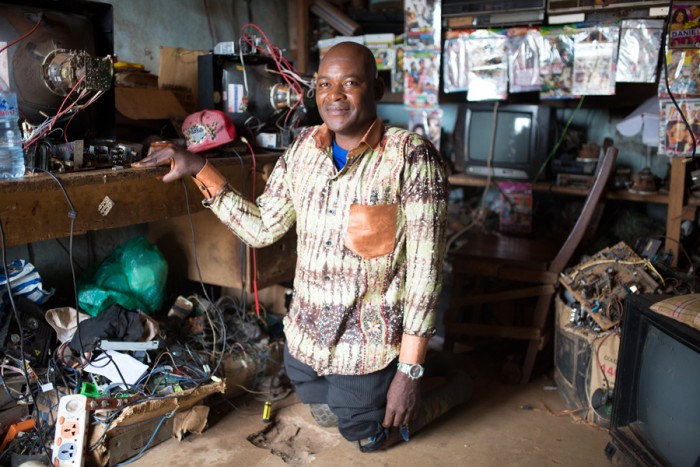
Michael is a electrician living in Bali who fixes electronics and has a mobility disability. ”
How did you become disabled?” I asked Michael.
“That was at the age of seven. I slept one night. I get up in the morning and I was weak. My father and mother took me to the hospital. But they couldn’t find anything. They took all the exams and they have seen nothing at all. Since then I’ve become disabled. Before seven, I was walking and going to school. After sometime, I stopped going to school. That’s how I became disabled,” said Michael.
“Why did you have to stop going to school?”
“Because it took me some time. It took me long time. At that time, I was in Nigeria, and I was there until ten years. I moved to Cameroon. When I was 15 years, I went back to school. I finally got a tricycle and that helped me go to school. I finished primary education but not secondary education. I couldn’t find people to help me go to secondary school.”
“What are your biggest difficulties as a person with disability?”
“So many difficulties. When I was going to school, I had to look for someone who could pull me. They don’t want to do it because they’ll be late to school. There are difficulties with the tricycle because you need someone to pull you to go. Life is very hard for disabled people. Because to find themselves is not easy. You need something but you’re not able to have it. You find someone to help you have it. You find so many difficulties. People always see disabled people as beggars. When I come to you, you think I’m coming to beg you. But that is not true. They always make disabled people not feel free to come close to them. They always see disabled people as beggars but it’s not true.”
“Why is wheelchair is not an option?” “Wheelchair is not an option because you cannot move around town with it.”
“Why you can’t move around town with it?” “Because of the roads. They’re not smooth.”
October 3rd, 2016 by Rachel | Tags: Food, Peace Corps, Second Goal | No Comments »
Shortly after I arrived in Bamenda almost two years ago, I showed Hilda and Ruth how to make pizza. Last month, I showed Hilda how to make brownies. Hilda asked me to show her again how to make Americans’ two beloved dishes and also teach her friends. So, I came to her house this past weekend and showed them how to make pizza and brownies.
The moment showed culture exchange at its best. When I came to the house, I was greeted with a Cameroonian dish, fish with groundnut sauce. When we finished eating the Cameroonian dish, I proceeded to teach them how to make pizza and brownies. As we cooked throughout the evening, we shared various cultural differences. “In Cameroon, there are many cows and goats. Why is cheese not produced here?” I asked.
“It’s just not part of our culture,” said Hilda.
“How does the brownie taste?” I asked one woman.
“It tastes very sweet,” she said.
We then discussed how Cameroonians don’t like many of the American meat dishes, such as BBQ pork or steak because they taste too sweet. Meanwhile, when they served baton de manioc with the fish with groundnut sauce, I was blunt and told them that I do not like it at all, and when I ate it for the last time in Mengong, I said, “Never again!” although I did recently eat some fried baton de manioc, which I enjoyed very much as it tasted different – it tasted like mozzarella sticks. Hilda understood my sentiments about not liking baton de manioc as there are American dishes that she does not like to eat. In every culture, we develop our own palette and become accustomed to certain tastes as we grow up eating certain food based on what our families and communities cook.
However, they all enjoyed the pizza and brownies so much as they made comments such as, “This is so good,” and “We’re going to make this.” Two of the Cameroonians had note pads and wrote down directions on how to cook both dishes.
One asked, “Will you make pizza and brownies for your send off party?”
I’m not sure if the question was a joke or serious because send offs are traditionally organized by people who are saying good bye to the person who is leaving, and I responded to the person saying, “I’m not organizing the send off. Ruth and Samuel are.” Either way, the question was still flattering because it meant that the person liked the dishes so much that the person wanted more.
